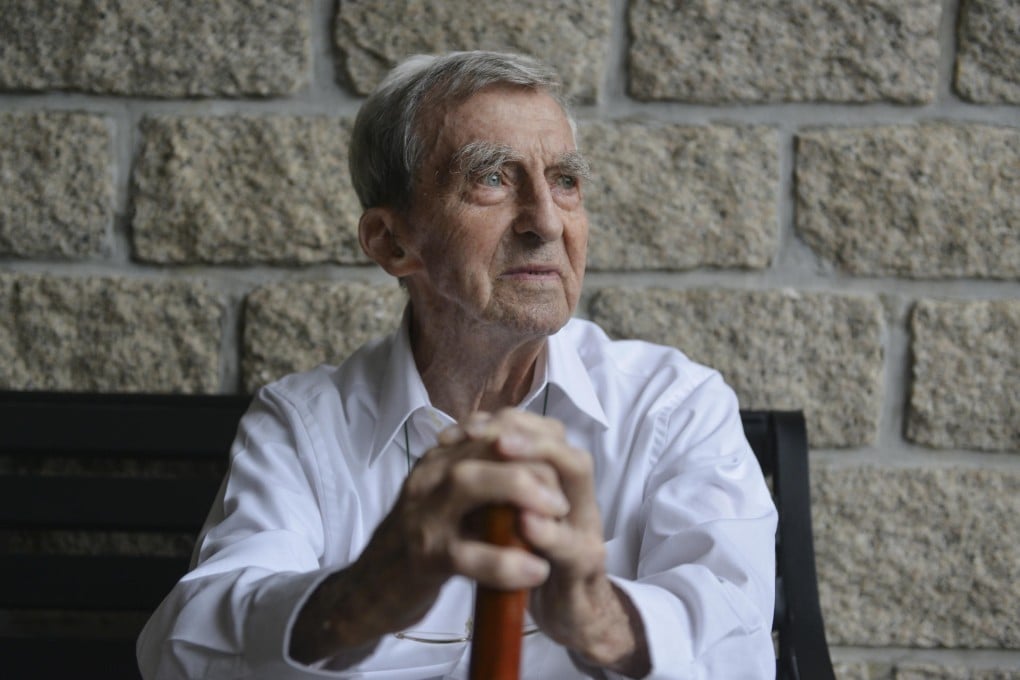My life: Father Joseph Mallin
The Irish priest and former Wah Yan College teacher, who celebrated his 100th birthday on Friday, revisits a century of memories, both good and painful, with Fionnuala McHugh

My mother didn't talk about my father (Michael Mallin). I think she didn't want us to brood on it. He was very taken with music and when he was 14 years old, he'd joined the British Army as a drummer and he went to India. Why did he turn so much against the imperialist army? Maybe it was what he saw there. Because he was among the leaders (of the Easter Rising, an insurrection staged by Irish republicans against British rule in Ireland), he was executed by the British at Kilmainham Gaol (in Dublin), in 1916. I saw her crying once, that would have been in the early 1920s. My sister and I were playing, and I went to the kitchen and my mother was standing at the window. I can be very clear about the day - it was a fine, May day. And I've often thought since: was it May 8th? That was the anniversary of when he was executed. I walked away, told my sister and we both kept quiet.
My father had sent for me in prison and I was brought to Kilmainham, but I was only two. I've no memory of it. But what were the feelings my father must have had? Four children, another one coming, we were destitute, he'd brought his family to that. And during the court martial, my father did try to avoid execution. He knew they wouldn't shoot Countess Markievicz, a woman (and fellow nationalist leader) - should he use that? It must have been a terrible thing for his conscience. He said she was the commander. Of course it wasn't true but what could he do? When you're faced with these things, what answer do you give?
My mother never told me my father had written a letter from prison to say he wanted me to be a priest. But my elder brother, Sean, became a Jesuit and he was the one who directed me to them. My sister, Una, became a Loreto nun. Another brother, Seamus, by the way, was caught with a gun during the civil war and he was to be executed but, in the end, he went to jail, and afterwards to Venezuela. I expected to stay in Ireland but I was sent to China. It took four weeks by boat to Hong Kong. Six of us went out in 1948, I was the oldest. They're all gone now. I'm the oldest Irish priest in the world.
At the beginning of September 1948, we went by train to Canton. I wasn't worried because I didn't know what was going to happen … then the communists were coming and I had to lead the retreat. My job was to bring the furniture down to Hong Kong, which I did - we threw it all out afterwards because it was wormy, so I needn't have bothered - and I took the boat. This was in May 1949. It was a nice journey, they had gates all round the captain's quarters, so you couldn't be hijacked. Afterwards, in the crisis time of the 1950s, I knew so many priests who were thrown out of China. They'd arrive at Wah Yan (College) - we were in Robinson Road then - and they'd just come out of prison; you had to burn their clothes. We'd get the tailor in, he'd hold all their measurements in his head. One priest didn't appear for a long time and the others said, "He's in the shower, he won't come out - he says it's heaven."
I don't think my father would have minded that I ended up in a British colony. I was with the Jesuits and local people learned the difference. The biggest thing that changed Hong Kong was the Shek Kip Mei fire, in 1953 (which left 58,000 people homeless). I was on an American cruiser that Christmas Eve, saying Midnight Mass, and we heard the news in the morning. Until then, people would come for a few years, then go back to China when the warlords changed. They always want to return to their homeland. But (then governor Alexander) Grantham had a meeting and he said, "These people won't be going back." They started building housing and they did a good job.
I'd set up Pun U Association Wah Yan Primary School and there was a teachers' strike in 1973, which was badly handled by the colonial secretary. We had such a wonderful crowd of teachers. The strike split schools but we had, as someone said, a happy strike. I also taught (Democratic Party founding chairman) Martin Lee (Chu-ming). His father was a military man, a tremendous influence for good on the school. Martin was very sharp. Donald Tsang (Yam-kuen) was a pupil. He's a decent person, it's a pity he spoilt things at the end. You have to be careful here … I could make millions. To get into a good school? Millions!